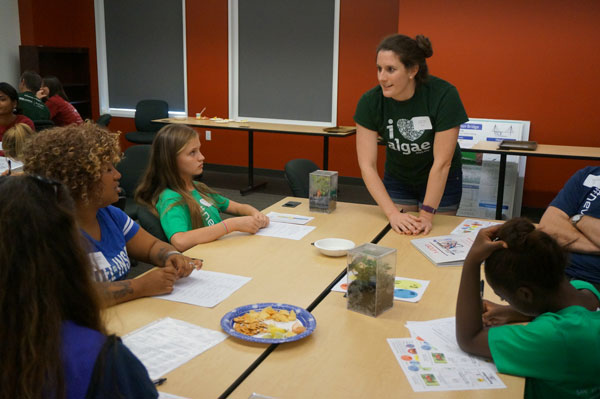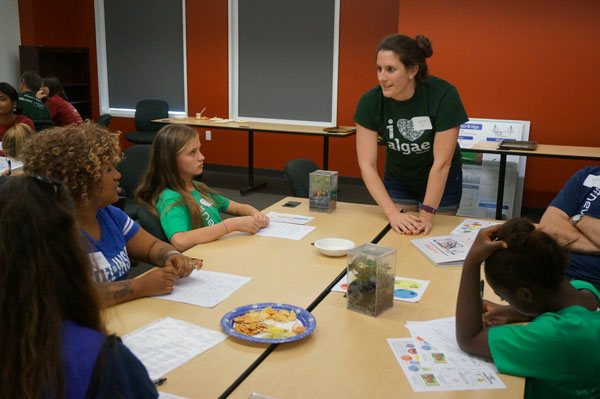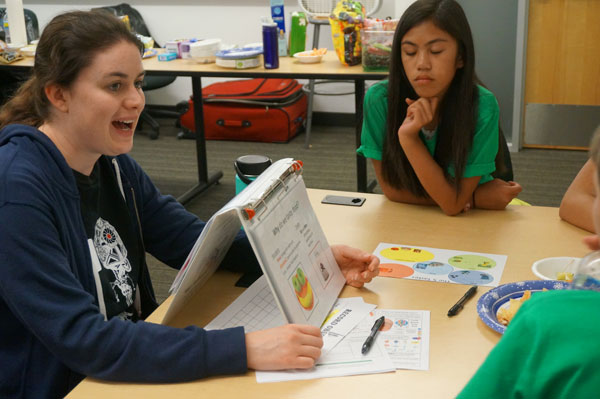Sandia biochemist Carolyn Fisher designed and organized what was perhaps the tastiest workshop at a recent conference for middle and high school-age girls.
The 2018 San Joaquin Expanding Your Horizons conference assembled 550 girls in the 6th through 12th grades to encourage interest in science, technology, engineering and math. The girls came from nearby San Joaquin and Stanislaus counties on Sept. 22 to the University of the Pacific in Stockton, California.

By guiding the girls through an experiment with a special fruit, Carolyn and her team of volunteer workshop leaders taught the girls not only about the biochemistry responsible for the taste of food, but also about using scientific approaches to understanding natural phenomenon.
The fruit in question is a “miracle berry,” or Synsepalum dulcificum, a West African fruit so named for its ability to make sour or bitter foods taste sweet. The effect only lasts for a short time, and only with foods that are acidic. During the workshop, the girls tried a variety of foods both before and after trying the miracle berry, recorded the data from their tastings, and were asked to form a hypothesis about the taste data they collected.
Students worked through the scientific method to better understand how the miracle berry changed the way they perceived taste, changing a lemon, for example, into something that tasted like candy.
“Our ‘Reverse Your Tastebuds’ workshop is a demonstration of protein-ligand interactions and signal transduction pathways that we rely on every day for sensory perception,” Carolyn said. “In other words, we showed them a little about the science behind their senses and hopefully got them excited to learn more. These basic biochemical principles are integral to chemical and biothreat characterization, an important part of Sandia’s biodefense mission.”
Carolyn has participated in EHY conferences since 2012, and Raga Krishnakumar of Systems Biology is also a veteran volunteer. Several others on Carolyn’s crew were first-time EYH volunteers, including postdoctoral fellow Catherine Mageeney, Pam Lane and Frances Carcellar, all of Systems Biology, along with this reporter. The experience was overwhelmingly positive for all.

“Growing up, I remember looking up to women excelling in a variety of fields — biology, physics and engineering — with a sense of awestruck wonder. Getting to play that role for the younger generation now is awesome,” Frances said. “Seeing the girls’ raw curiosity and enthusiasm revitalizes how I see my own work.”
Conference-goers attended a total of three workshops throughout the day that featured hands-on STEM-related activities. In addition to the taste bud workshop, offerings included: making a battery using oranges and lemons to
power an LCD display, dismantling and rebuilding a working computer, and programming a LEGO robot for eventual battle in a robot war.
Rounding out the day, the girls were treated to a keynote speech by Candice Gellner, a technology transfer executive at Lawrence Livermore National Laboratory. Gellner has a background in biomedical research. She spoke to the girls about the anxieties she felt in her early days of studying chemical engineering, and the great professor she had who helped her overcome her fears.
Sandia, Lawrence Livermore and the University of the Pacific’s School of Engineering and Computer Science are the organizing sponsors of this annual conference in Stockton. EHY

Stockton is part of the EYH Network, a national program based in Oakland. Conferences also happen throughout the year in other cities.
To volunteer for future EYH conferences, contact Cary Gellner at gellner1@llnl.gov.